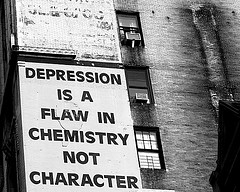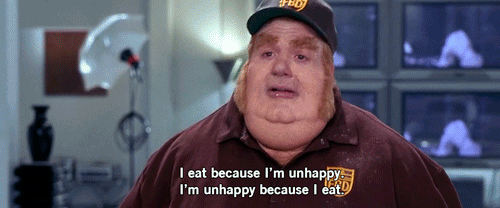The Link Between Depression & Obesity

Earlier this year an intriguing new study provided all of us working in industry with some invaluable insights into the link between depression and obesity.
Conducted by Dr Aurelie M Lasserre of Lausanne University Hospital in Switzerland, the study revealed that the atypical subtype of major depressive disorder is linked to greater risk of obesity; a link that’s not found in other subtypes of the illness.
The Study
The study was a prospective population-based cohort study that included 3,000 randomly selected Lausanne residents with a mean age of 50 years-old (53% women).
At baseline, 7.5% of the 3,000 participants met the criteria for MDD, with 37% having had a previous major depressive episode. Of these, about 10% experienced atypical depression and melancholic episodes, while 14% experienced purely atypical episodes.
The Findings
Dr Aurelie M Lasserre and her team found that the subjects who experienced atypical episodes of MDD tended to have a higher increase in adiposity [fat] than those with MDD, and were nearly four times more likely to be obese.
"For the clinician, the atypical subtype deserves particular attention, because this subtype is a strong predictor of adiposity," reported Dr. Lasserre. "Accordingly, the screening of atypical features and, in particular, increased appetite in individuals with depression is crucial."
The report, published in JAMA Psychiatry came to the conclusion that atypical MDD is a strong predicator of obesity, while those with melancholic, combined, or unspecified major depressive disorder (MDD) showed no greater risk for fat-mass gain than those without any form of MDD. The researchers found no evidence for medication or physical activity affecting the link between adiposity and atypical MDD.
“This study emphasises the need to identify individuals with this subtype of MDD in both clinical and research settings,” wrote Dr. Lasserre. “Therapeutic measures to diminish the consequences of increased appetite during depressive episodes with atypical features are strongly advocated.”
Most medications for major depression or bi-polar depression cause you to gain even more weight. It would be nice for my depression to disappear as I lose weight, but I am not getting my hopes up. I was skinny and depressed before I gained lots of weight and became obese and depressed. Overcoming depression is more complicated than simply losing weight.
I believe there is a link between depression and your gut bacteria, (normal intestinal flora). I have no scientific evidence of this but I sure wish studies would be conducted. I also believe that your gut bacteria may have an impact on what you choose to eat. Again, I have NO studies to back this theory up but since I had the surgery and stopped craving sweets and thus stopped consuming sweets and carbs---my depression has improved. I know this is highly anecdotal evidence but I think our digestive system is so much more involved with mental function, how we feel overall etc.
Blessings,
Kathleen
I too suffer from clinical depression and anxiety. I do take medication for it and my psychiatrist has to watch me closely because it can increase appetite thus leading to me eating too much and as a result weight gain. Then as a result I become more depressed.
My advice is for anyone who might even THINK they may be suffering from this deadly disease is to seek medical professional help immediately.

Post surgery I don't have that hunger anymore, I am hoping to get addicted to that weight loss and healthy style rather than comfort foods like before.
today marks 2 months that I have not had a single adult beverage. (that is a big deal for me as a guy who could put down a liter of whiskey or more a week)
Hope they didnt spend a fortune on this study.
People with major depression use all kinds of substances to numb out...food, drugs, alcohol, sex, ...food releases endorphins (ergo comfort food) it affects the hypothalmus the pleasure center. You can feel, numb. sleepy, coma like, comforted for the moment.
All addictive substances work the same way.
However a person with a MDD will not overeat lettuce and an alcholic will not overdrink milk. Each chooses chemically altering , brain altering things
Psych med hugely affect weight gain and metabolism. I added a med that I totally forgot about and then gaimed ike 60lbs. But I wasnt eating more. I went to all kinds of doctors, who either ruled out hypothyroidism or frankly didnt beleive me that I was not overeating. "Calories in Calories out" PAHLEEZE. They I remembered this drug that was added, research it, caused weight gain, removed it and weight came off.
It affect sex drive too...so save that study money.
Depression can make people eat..then eating wheat flour and sugar for an addict will set up a chemical dependency and then the depression/wt gain vicious cycle is in motion. Then your in chicken or egg territory. Basically its addiction and when you a depressed you want to alter your feelings fast and often.
And if you are a sugar addict, the quicket way to get the sugar craving going is drinking alcohol. Its like injecting sugar right into your veins. If you are not an alcoholic, you will then be off on a food binge from a drink.
.
HOW DO YOU GET PAID TO DO THESE STUDIES???? HIRE ME PLEASE







gowalking 10,790
Posted
Obesity and depression....is like the chicken and the egg. Which came first? Does the depression cause overeating or does one become depressed when overweight? No matter...they are linked regardless of which causes which.
Share this comment
Link to comment
Share on other sites